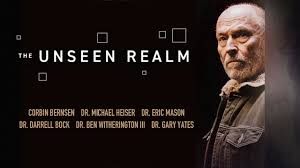The Bible is viewed in many different ways.
Some see it as a how-to book for life or an “owner’s manual” for the soul, if you will. Some see it as a collection of myths and tales from an unenlightened past. Some see it as a sacred object for use in the holiest of settings. Some see it as a foundation of Western culture.
One of the things I appreciate about Michael Heiser’s The Unseen Realm is the overall approach he uses with the Bible. Primarily, he tries to take the Bible on its own terms, in its own context.
He tries not to impose his own ideas, preconceptions, or needs on the text. He begins by wondering what the original writers thought, what kind of culture they lived in, what kind of assumptions they had about the world. As he puts it, “The realization that I needed to read the Bible like a pre-modern person who embraced the supernatural, unseen world has illumined its content more than anything else in my academic life” (385).
We are fortunate to live in a day of widely available access to ancient documents and archaeological research that have emerged in the last two hundred years. They give us greater understanding of the worldview and the mind of the original biblical writers. We are also more alert to how our own Enlightenment, scientific, or postmodern mindsets can lead both believers and skeptics to impose ideas on the Bible that just aren’t there.

One example: The biblical writers simply didn’t have a category for a how-to manual that allows one to take individual verses out of context for instant answers. They did however have a category for wisdom literature that requires slow, lifelong meditation on texts that may at times seem to be at odds with each other.
Another example: The biblical writers did not employ modern historical methods or criteria. They couldn’t. They employed their own customs and used genres common to their day to tell stories for their own purposes. To label these as “inaccurate” or “in error” by today’s standards is an exercise in missing the point.
In particular Heiser takes aim at the misguided assumption that a literal reading is the truest approach to Scripture, that such a method is the primary way God intends us to read the Bible. When we do, we fail to understand how much scientific and materialistic ways of thinking (which are foreign to the Bible) have come to dominate our own perspective. As he writes:
Metaphorical meaning isn’t “less real” than literal meaning (however, that’s defined). Whether we like it or not, the biblical writers weren’t obsessed with literalism the way we seem to be…. Biblical writers regularly employ conceptual metaphor in their writing and thinking. That’s because they were human. Conceptual metaphor refers to the way we use a concrete term or idea to communicate abstract ideas. If we marry ourselves to the concrete (“literal”) we’re going to miss the point the writer was angling for in many cases.
He gives this example, “If I use the word ‘Vegas’ and all you think of is latitude and longitude, you’re not following my meaning. Biblical words can carry a lot of freight that transcends their concrete sense. Inspiration didn’t immunize language from doing what it does.” (387)
We can’t completely get out of our own skin and crawl into the framework of those who lived two or three thousand years ago in a very different culture. But the journey into the world of the Bible and then back into our world is so worth it.
Note: If you would like a video summary of the book, The Unseen Realm documentary can be found here on YouTube. At just over an hour, this presentation features Michael Heiser and several other respected biblical scholars who offer a clear, succinct overview of the key points from the influential book.
Next Installment: Concerns about the Unseen Realm (Part 5)
—
Image by StockSnap from Pixabay

